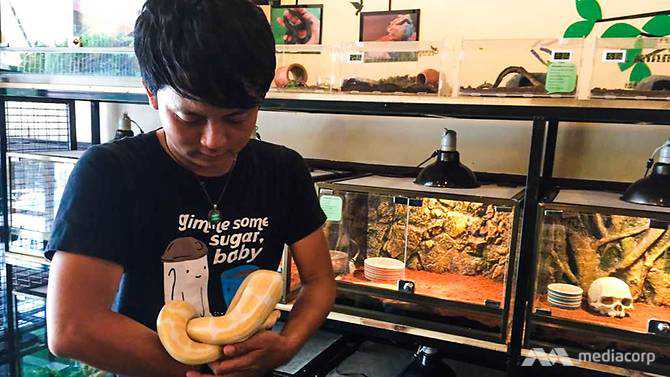Animal cafe trend a concern for wildlife experts in Cambodia
06 October, 2018

As the trend to keep and display exotic animals in cafes in the Cambodian capital grows in popularity, wildlife experts have warned that the animal trade is largely unregulated and could be putting creatures at risk.
Reptile Cafe, one of the city’s recent openings, is located on a quiet corner of Street 448 in Phnom Penh. Inside, a few cages filled with iguanas are displayed at the front door. On the left is a cage for a large red parrot, while further in, several other glass enclosures are filled with orange corn snakes, geckos and spiders.
They are unlikely and unconventional coffee mates, but all of them have been brought into the country to spark the curiosity of customers, according to owner Chea Raty, 32.
“Seeing the growing market for coffee shops, I had an idea and wanted to open a small cafe and show off the species that I love,” he said.
He now has more than ten different species on show, which guests can freely interact with. And he plans to introduce more.
“As some customers sip their coffee, they'll see that others dare to hold these animals. And they too would want to try and touch them.”
None of these animals, however, has proper documentation. Instead, they were registered as pets by the Ministry of Agriculture, Forestry and Fisheries.
Similar to Raty, Nay Sokhondara, 25, said he started his Zoo Cafe four months ago after seeing the potential of combining coffee and animals.
The species he keeps in his busy establishment include marmosets, guinea pigs, a chinchilla and a raccoon.
“Many young people don’t know these animals, so I want to introduce them,” he said.
A marmoset in Zoo Cafe. (Photo: Ouch Sony)
Most of them were bought from a farm in Thailand, and some he brought back from Vietnam. He has no formal documents to bring them across the border and admitted to taking a risk in doing so.
“I have some people there. I know them, so I can trust them. Then sometimes, I paid them also,” Sokhondara said. “I need to spend one day to transfer my pets individually.”
None of the species, he added, is endangered and he too has registered them as house pets with a five-year licence. His next plan: To source a small kangaroo from Thailand and create a breeding farm.
Sarah Brook, a technical adviser to Wildlife Conservation Society (WCS), said the trend of exhibiting wild animals is a worrying one.
“Wild animals do not make good pets, so it not good to encourage this practice,” she said.
“Even when bred in captivity they need a lot of care, a good diet and an environment similar to their natural habitat, and free of disturbance and stress.
“I don’t think a cafe in Phnom Penh can provide that.”
Orange corn snakes are unlikely and unconventional coffee mates in Reptile Cafe. (Photo: Ouch Sony)
She added that Cambodia needs to take stronger legal action and implement better enforcement to prevent the illegal wildlife trade from thriving.
“It is a very big problem in this region, for pets, meat, medicines and other products,” she said.
However, Keo Omaliss, Director of Forestry Administration, played down the concerns and said these types of cases were inconsequential.
“For Cambodia, I think there is not much cross-border illegal trade of wildlife. It is so little,” he said.
He said there was no problem with the animals being registered inside Cambodia and put on display in captivity as long as they were not on the endangered species list, and that the purpose was to educate the general public.
“Whether this activity affects the number of wild animals in the natural forest or not, this is something important we need to focus on. But if their activities are just to make people love animals, it’s a good thing," he said.
An iguana in a cage at Reptile Cafe in Phnom Penh, Cambodia. (Photo: Ouch Sony)
However, Nick Marx, Wildlife Alliance's director of wildlife rescue and care, said these animals should be sent back to their natural habitats.
"Keeping wild animals in small cages is unkind," said Marx.
"This kind of practice serves no benefit for conservation. It is clearly for entertainment to attract customers."
While Wildlife Alliance is working to combat the illegal trade of Cambodian wildlife within the country, he believed that these particular species were not indigenous to Cambodia and therefore not within his organisation’s jurisdiction to act and confiscate them.
"It should be the job of the Cambodian government to make sure all these animals are kept properly and all these shop are acting legally."
